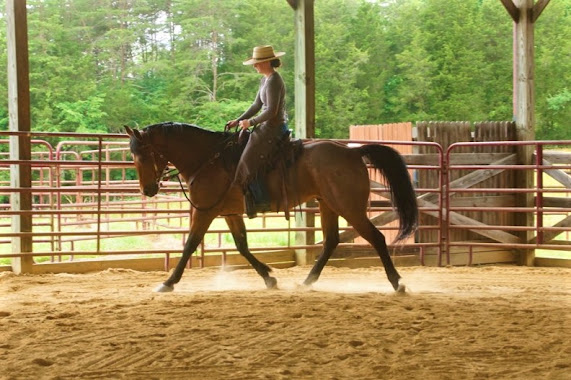Beginning
"Horsemanship": the practice of working with horses
"Survivorship": the state or practice of being a survivor
"Lifemanship": the art of getting through it all
I realize that every little girl growing up goes through some period where they loooovve horses. They gallop around on all fours around the house and strain their necks in the car at every passing pony grazing in a field. (True story: it's impossible for a horse-crazed child not to yell "PONY!" at every passing horse they spot.)
(Also a true story: I still do that. I also yell out when I see cows. Which happens often. It is Vermont, after all.)
(Another true story: actually, I am relatively sure I yell out the names of most animals I see while driving, domesticated or otherwise....)
Anyway.
I'm Abbie Senesac Lopez. I'm a horsewoman, a survivor and fellow student of lifemanship. The horsewoman part is pretty self-explanatory: I got bit by the bug early in my life and it thankfully never got it cured. Horses have been in my life in some form since I was a small child; thirty-something years later, it's hard for me to fathom how I would have gotten to be standing where I am without their mentorship.
For those who ride, drive or otherwise keep horses, you know exactly what I'm talking about.
For those less learned in this area of study, I'll fill you in a little: humans have a lot of reasons for choosing to work with horses. For a few, it's an extension of ego: I'd dare say any horseperson has lived here for a bit. Many of us vacillate back and forth each time we go to get our horse from the paddock. For others, it's an escape. Most of us have lived here, too: you need not search too long in any barn before you find someone with a story of sobbing into a beloved horse's mane or stall corner at some point in their youth (or, fine, adulthood.)
But for some of us, working with horses is something else. They help us be better. They help us see. They show us how to navigate all those areas of a our lives that are just, well, hard. And sometimes painful. This is the group I belong to. Horsemanship is part of how I make my livelihood, but it's also how I live my life.
The survivor part is a bit less apparent. Our bodies all bear the scars of our mishaps and mistakes but plenty of those can't be understood by inspecting one's skin. There was a time I was ashamed of mine, times where they felt like they exposed giant chasms of my soul to any errant passerby who had two eyes in their head and a flickering light on upstairs, if you know what I mean.
I don't feel that way anymore. I'm a survivor of sexual abuse. It's part of my fabric, and I've learned over time that stains on the blanket of your life means you lived. Hopefully, living also means you're learning, and as odd as it sounds I am grateful for what my trauma has taught me. My "survivorship" has informed my horsemanship, and my horsemanship has informed my survivorship. Both have informed my life.
So this blog will serve a few purposes: a personal journal of success, of failings, of frustrations and the glimmers of hope that inevitably follow. Perhaps a guide for "how to heal" - whatever that means, I'm still figuring it out.
But mostly, I'm hoping it will help someone. Maybe it's naive, or possibly even a bit egotistical, but my greatest hope is that something I write, be it about horses, about life, about trauma...something will click for someone. That something, whatever little morsel it may end up being, will help someone get a bit better with their horse or maybe even themselves. If I've learned anything about horses, it's that they are an animal that constantly adjusts to their environment to make the best of their situation. I strive to try and do the same.

Comments
Post a Comment